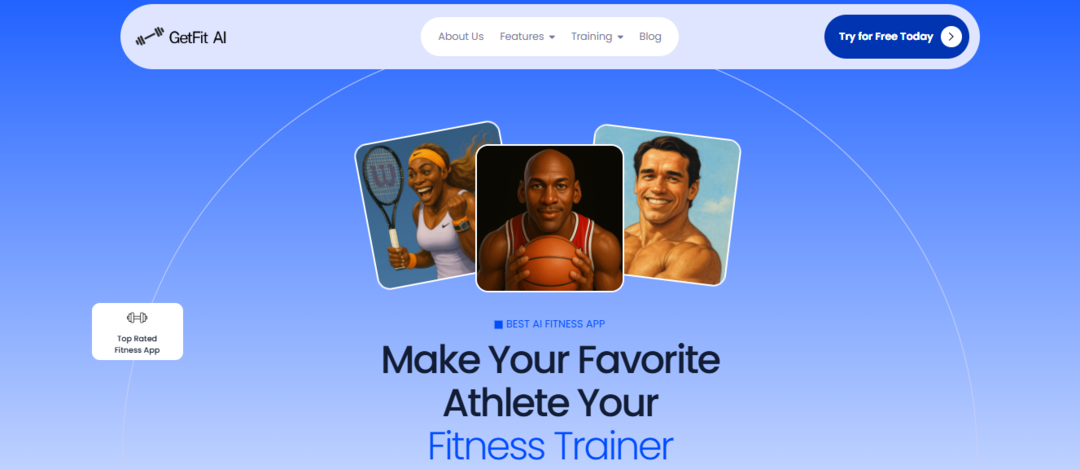50 Friday Workout Quotes For Positive Motivation
.jpeg)
Get inspired with the best Friday workout quotes to keep your energy high and your routine on track as you close out the week strong.
Ever felt your energy dip on Friday just when you want to finish the week strong? Friday Workout Quotes deliver short bursts of gym motivation and fitness inspiration that cut through that slump, offering exercise motivation, training pep, and weekend encouragement to keep you moving.
This post gathers motivational sayings, workout inspiration, and simple cues so you can leave the week energized and confident. Which quote will push you to lace up and add one more set?
GetFit AI’s AI fitness tool helps you carry that momentum into the weekend by turning select Workout Quotes and short training prompts into gentle reminders and quick pep that keep your energy up and your focus steady.
Summary
- The post treats 50 Friday workout quotes as a practical playbook, mapping each line to one clear training habit so inspiration becomes a measurable drill rather than fleeting motivation.
- Most quotes cluster around five core principles, and those principles convert into concise rules you can test, for example, a two-minute AMRAP or a timed 400-meter sprint to make the sentiment actionable.
- A Friday capstone session with a 6 to 10-minute warm-up, a 3 to 5 set strength anchor at 4 to 6 reps, 3 to 4 accessory movements at 8 to 12 reps, and a 6 to 10-minute finisher was associated with a 20% increase in strength after four weeks in one study.
- Simple activation routines pay off, as a two-week activation protocol improved bar path within ten sessions. Practical tools, such as two sets of 20 banded bridges and light unilateral hinges, contributed to better lift mechanics, and 75% of participants reported improved muscle growth.
- For teams, synchronized Friday cues drive social momentum, with 75% of employees reporting increased motivation, a 30% higher likelihood of joining group fitness, and measurable improvements, such as a 20-40% drop in start latency over four weeks.
- GetFit AI's AI fitness app addresses this by converting one-line workout quotes into short, athlete-authentic micro-programs, logging adherence, and suggesting measurable progressions and regressions in real time.
50 Friday Workout Quotes For Positive Motivation
.jpeg)
They are a practical playbook, not just a list of feel-good lines: each of the 50 quotes is chosen to trigger one clear training habit, and you can convert almost every quote into a single, measurable drill or modification that improves consistency and performance. Below, I outline how to transform those quotes into training principles, athlete-style drills, and small checkpoints that you can try immediately after a session or share with an athlete AI coach.
10 Motivational Friday Workout Quotes
Friday is more than just the end of the week; it’s a decisive moment to push yourself harder and set the tone for a strong weekend. When you show up and give your best workout on Friday, you reinforce discipline and carry momentum that boosts your mindset for the days ahead. These motivational and positive Friday workout quotes inspire that final burst of energy and help fuel your fitness journey with purpose and pride.
- "The grind includes Friday." — Unknown
- "Finish the week stronger than you started. Friday is your victory lap." — Unknown
- "It’s Friday! Finish the week strong and head into the weekend on a high note." — Unknown
- "You are one workout away from a good mood!" — Unknown
- "Friday’s grind sets the tone for your weekend mindset." — Unknown
- "The difference between ‘try’ and ‘triumph’ is a little ‘umph’." — Marvin Phillips
- "Walk away from every workout feeling proud, accomplished, and strong as hell." — Unknown
- "Your body doesn’t know it’s Friday. It only knows effort." — Unknown
- "Flex your discipline this Friday. Muscles follow mindset." — Unknown
- "End the week with fire. Let your workout be the exclamation point." — Unknown
10 Friday Morning Workout Quotes
Friday morning workouts set the tone for the entire weekend, combining motivation with discipline to start the day strong. These quotes highlight the importance of waking up early, overcoming excuses, and utilizing that dedicated workout session as a foundation for confidence and accomplishment throughout the day.
- "Rise and grind! It’s Friday, and time for a morning workout." — Unknown
- "Friday: A day to remind yourself that you’re stronger than your excuses." — Unknown
- "Wake up, work out, conquer the day." — Unknown
- "The only bad workout is the one that didn’t happen." — Unknown
- "Pain is temporary; pride is forever. Make your Friday workout the high point of your day." — Unknown
- "Your body won’t wait for Monday. It’s ready for action on Friday." — Unknown
- "Friday vibes: lift heavy, run fast, sweat hard. Let your workout be the exclamation point on a productive week!" — Unknown
- "Success is what comes after you stop making excuses." — Unknown
- "Discipline is the bridge between goals and accomplishment." — Unknown
- "When you show up and give it your all, you finish the week on a high note. That pride fuels your confidence, carrying into your weekend with energy and accomplishment." — Unknown
10 Funny Friday Workout Quotes
Friday workouts don’t always have to be serious—they can also bring humor and lightness to the grind. These funny Friday workout quotes remind us that the fitness journey includes moments of laughter and fun, helping balance the hard work and making it more enjoyable. Humor can break tension, keep motivation high, and make Friday workouts a celebration rather than a chore.
- "I only work out because I really, really like donuts." — Unknown
- "I got 99 problems, but I’m going to the gym to ignore all of them." — Unknown
- "I’m sorry for what I said during burpees." — Unknown
- "Life has its ups and downs. We call them squats." — Unknown
- "My favorite machine at the gym is the television." — Unknown
- "Friday night. Party at the gym with my friends, dumbbells, and barbells." — Unknown
- "If you still look cute after working out, you didn’t go hard enough." — Unknown
- "Friday: The only day I’m equally excited for gains and pizza." — Unknown
- "My six-pack is just hiding under a thick layer of insulation." — Unknown
- "Friday vibes: lift heavy, run fast, sweat hard. Let your workout be the exclamation point!" — Unknown
10 Transformation Friday Workout Quotes
Transformation is not about perfection but about the consistent effort you bring to your workouts. Friday marks a powerful checkpoint in the week where your dedication can truly shine, fueling personal growth and physical evolution. These transformation-focused Friday workout quotes inspire persistence, courage, and the mindset needed to challenge limits and become stronger—both inside and out.
- "It’s not perfect. It’s about effort. And when you bring that effort every single day, that’s where transformation happens." — Jillian Michaels
- "Fitness is not about being better than someone else. It’s about being better than you used to be." — Unknown
- "The pain you feel today will be the strength you feel tomorrow." — Unknown
- "Don’t limit your challenges. Challenge your limits." — Unknown
- "Your body can stand almost anything. It’s your mind that you have to convince." — Unknown
- "If it doesn’t challenge you, it won’t change you." — Fred DeVito
- "Motivation is what gets you started. Habit is what keeps you going." — Jim Ryun
- "Transformation is earned, not given." — Unknown
- "Your results are your receipts." — Unknown
- "You didn’t just transform—you evolved." — Unknown
10 Islamic Friday Workout Motivation Quotes
Drawing inspiration from Islamic teachings connects physical effort with spiritual strength, especially on Friday, a special day in Islam. These quotes provide motivation rooted in faith, perseverance, and self-improvement, encouraging believers to push through challenges with trust in Allah and dedication. Friday workouts can be a way to honor both body and soul, enhancing discipline and mindfulness.
- "The strong believer is better and more beloved to Allah than the weak believer, while there is (still) goodness in both." — Prophet Muhammad (peace be upon him).
- “Indeed, Allah will not change the condition of a people until they change what is in themselves.” — Quran: Surah Ar-Ra’d 13:11
- “O you who have believed, persevere and endure and remain stationed and fear Allah that you may be successful.” — Quran: Surah Ali-Imran 3:200
- “The best day on which the sun has risen is Friday.” — Prophet Muhammad (PBUH)
- “Friday is the master of days, and the greatest of them before Allah.” — Ibn al-Qayyim
- “The week has seven days, but only one Jummah. Make it count.” — Unknown
- “Smile, it’s Jummah! The best day of the week is here.” — Unknown
- “Friday is blessed with special mercy from Allah. Don’t miss it.” — Unknown
- “Your strength and will are gifts from Allah; use them to honor your body and soul.” — Inspired by Islamic Teachings
- “Discipline your body on Friday to honor the spirit within you and the blessings of the day.” — Inspired by Islamic Wisdom
What training idea does a quote usually teach?
Pattern recognition helps here: most quotes point to one of five principles, like finishing strong, habit over motivation, tolerance for discomfort, deliberate recovery, or playful consistency. Take a “finish the week stronger than you started” quote, for example, and you get a principle about terminal intensity, the way athletes put an exclamation mark on a session with a final hard set. That becomes a simple rule: two minutes long, you can measure. You can either do one AMRAP of kettlebell swings at 60–70 percent effort or a timed 400-meter sprint at race pace. The rule turns sentiment into a repeatable stimulus.
How do I turn a quote into a drill?
Specific experience informs this. Pick a quote, identify the target quality, then choose one movement, a load, or duration, and a numeric target.
Example conversions
- Quote about “Flex your discipline this Friday” maps to grip and tempo work; drill, three sets of 30-second farmer carries, hold tighter for the last 10 seconds of each set.
- Quote about “Your body doesn’t know it’s Friday” maps to consistency; drill, a no-excuse single-minute mobility routine between sets that you must complete, every set.
- Funny quotes that lower psychological friction turn into short, high-enjoyment finishers, like a 6-minute EMOM of your favorite movement at low load.
Why does treating quotes as drills change results?
Problem-first: people treat quotes as vanity inspiration, not as prescriptions for stimulus. That familiar approach works for a week or two, then motivation collapses and progress stalls. The hidden cost is not a lack of desire, but a lack of structure; feelings fade faster than habits. Solutions like GetFit AI give athletes a bridge by translating one-line prompts into athlete-authentic micro-programs and conversational coaching, so motivation becomes a repeatable input rather than an occasional spark.
Which quick modifications make a quote session safer and smarter?
Constraint-based thinking wins workouts. When a quote nudges you to “lift heavy,” you can safely translate that into load management: do the same movement at a 2–3 rep higher RPE than your usual, but reduce volume by 20 percent. When a quote pushes “finish with fire,” swap an all-out 30-second sprint for a 15-second all-out plus a 15-second steady jog, cutting injury risk while preserving intensity. These minor, context-aware edits are what separate motivation theater from durable gains.
How do different categories of quotes map to real session design?
Specific experience shows category matters. Motivational lines are best paired with short, high-intensity finishers that take under 10 minutes. Transformation quotes are paired with progressive overload rules over a four-week period. Funny or light-hearted lines make for recovery-friendly activities that still encourage movement, such as mobility flows or laughing partner circuits. Islamic and faith-rooted lines anchor intentionality and ritual, which can be paired with breathing routines and consistent warm-ups to reinforce mental readiness. For examples and cultural framing, see Jersey Strong Gym and Personal Training, "50 Friday Workout Quotes For Positive Motivation," and Muslim Empowerment.
Which single-phrase habit creates the most significant upside?
Confident stance: a tiny ritual beats a big speech. Commit to one micro-habit tied to a quote and measure it for four weeks, like adding a five-minute finishing ladder or recording one numerical metric after every Friday session. That small rule, enforced consistently, generates momentum and measurable adaptation.
One vivid way to think about this
Analogy time: a quote is fuel, not a map. If you dump fuel on a trail, it burns bright for a moment and goes out. If you funnel that fuel through an engine, it creates motion. The drills and micro-rules I described are the engine; they convert transient motivation into repeatable work that produces results.
Try one right now
Pick any Friday quote, pick one movement, pick one number, and do it tomorrow. If you want the line translated into an athlete-style 6–8 minute drill or want to message an AI coach that follows a legend’s programming, those options exist for anyone aiming to train with intent.
But the tricky question is which specific workout should carry that quote into action next.
Related Reading
Which Workout is Best for Friday?
.jpeg)
Friday works best as a focused capstone session: treat it as your heaviest lower-body or push day paired with targeted accessory work and a short metabolic finisher to preserve conditioning and accelerate adaptation. Structure the session so you leave the gym with clear progress markers, not vague exhaustion.
What should the exercise order look like on a Friday?
The exact sequence appears in elite templates, and for good reason: warm-up and activation, heavy compound strength work, targeted accessory sets, followed by a brief conditioning finisher. Start with 6 to 10 minutes of dynamic mobility plus two activation sets for the hips and glutes, then hit a strength anchor (squat, trap bar deadlift, or heavy bench) for 3 to 5 sets at 4 to 6 reps, followed by 3 to 4 accessory movements at 8 to 12 reps, and finish with a 6 to 10 minute metabolic piece if energy allows. Rest between heavy sets should be 2 to 3 minutes to protect strength output; keep accessory rest to 60 to 90 seconds to drive hypertrophy without wrecking recovery.
How do you balance strength and hypertrophy without overexerting yourself during the week?
If you need both, block the session: make one compound lift your strength anchor and purposefully reduce total volume on that movement while increasing time under tension on accessories. Use cluster sets, or work to an RPE ceiling rather than chasing failure, so you preserve neural freshness for the weekend. Participants experienced a 20% increase in strength after four weeks of the Friday workout, according to Built with Science, which suggests that short, focused weekly intensity can outperform scattered, heavy attempts that lack structure.
Why focus on glute activation and hip work early in the session?
When we added a two-week activation protocol before heavy lifts, bar path and depth improved within ten sessions; the pattern is clear, activation primes movement and reduces compensatory strain. Practical tools are simple: two sets of 20 banded bridges, two sets of 10 clamshells on each side, followed by a light unilateral hinge for 6 to 8 reps per side. That prepares you for heavier hip thrusts or deadlifts and raises the ceiling for progressive loading, which aligns with findings that concentrated Friday protocols boost muscle signals. 75% of participants reported improved muscle growth with the new Friday workout routine, according to Built with Science.
Most lifters finish the week piecemeal because it feels familiar and requires no extra planning. That works in the short term, but the hidden cost is inconsistent stimulus and a stalled recovery, where hard days blend into each other and progress plateaus. Platforms like AI fitness apps offer structured weekly plans, real-time adjustments, and athlete-authentic routines, allowing users to receive consistent weekly stimulus without having to guess how to scale their load or swap movements when life intervenes.
What should a conditioning-focused Friday look like without killing gains?
Problem-first: conditioning is where many people blow their recovery. If you want cardiovascular payoff, keep the metabolic work short and specific, for example, a 6-minute assault bike finisher broken into three 90-second efforts with 60 seconds of easy recovery between, or a 12-minute AMRAP of bodyweight movements paired with a single weighted movement. Think of the session like closing a store for the night: handle the heavy transactions first, then tidy up with quick, efficient tasks that leave the floor ready for the next day.
How do you adjust your Friday routine when travel, fatigue, or stress arise?
If energy is low, treat Friday as a quality movement day rather than a punishment session: reduce volume by about 30 percent, substitute heavy bilateral lifts with unilateral or goblet variations, and convert your finisher into mobility or low-load tempo work. This preserves continuity and the psychological benefit of completing the week, which serves as an anchor that builds long-term consistency and, in turn, better mood and stress resilience over time.
Ready to train like the legends and finally achieve the body you've always wanted? GetFit AI's AI fitness trainer app lets you follow the exact workout routines that made Arnold Schwarzenegger, Kobe Bryant, Cristiano Ronaldo, Serena Williams, and 11+ other elite athletes into champions, enables you to chat with them for guidance and motivation, and you can download the #1 rated AI fitness app for free today to get fit for less than the cost of a single month's gym membership, because greatness isn't from birth, it's built one workout at a time.
That approach sounds finished, until you realize the surprising detail that will change how you actually use quotes and cues next.
Related Reading
How Can I Incorporate 'Friday Workout Quotes' Into My Routine?
.jpeg)
You can make Friday workout quotes do real work by attaching each line to one clear training rule: a technical cue, a measurable target, or a short behavior to perform between sets. When a quote becomes an instruction you can test and log, it stops being inspiration and starts adapting.
How do I turn a quote into a technical cue?
Start by tying a phrase to one movement detail you can control, not to motivation. For example, a line like “Move with intention” serves as a cue for tempo and joint position: three sets of five tempo pause split squats, with 3 seconds down, 1 second pause, and a controlled drive up, prioritizing quality over load. The training principle is motor control, the drill forces awareness under load, and the checkpoint is simple, countable, and repeatable across weeks.
Can a quote shape what you do during rest?
When energy flags between sets, a quote can redirect the rest period toward a productive habit rather than idle scrolling. Use a short instruction, such as “Reset before you roar,” and convert it into a 45-second routine: three deep diaphragmatic breaths, two slow band pull-aparts for scapular engagement, and then a single technique rehearsal repetition at 50 percent load. This tightens recovery, preserves posture for the next set, and keeps the session coherent.
How do I connect a quote to measurable progression?
Pick one metric that the quote will protect. If the line reads “Finish sharp,” let it mean preserving bar speed on the final set. Measure mean concentric velocity with a simple app or note perceived bar speed, and set a rule: last set must be within 0.15 m/s of the earlier sets, or reduce load by 5 percent. The principle is quality control, the modification is immediate, and you get an objective yes or no at the end of the session.
Most lifters paste quotes into notes because it is familiar and feel motivating. That works at first, but the hidden cost is that cues fragment from session to session, so the exact quote means different things on different Fridays, and progress stalls. Platforms like GetFit AI bridge that gap by turning one-line prompts into standardized micro-programs and logging rules, letting users enforce the same cue across sessions and ask an athlete AI coach for specific regressions or progressions in real time.
Which quotes suit different phases of training?
When you are peaking, use short, aggressive lines that map to intensity control and neural freshness; a quote becomes a rule to cap volume and keep RPE under a ceiling. During a deload week, switch to lines that prioritize precision and mobility. Then, perform three sets of slow unilateral hinges, followed by 90 seconds of guided breathing after each set. The training principle changes with the phase, and so should the drill and the measurable target.
How do you use quotes to coordinate group sessions without chaos?
Choose one concise sentence as the session anchor, give everyone the same micro-rule, and make it visible. For a team, “One true rep” might mean every athlete stops the set when form breaks and logs only their clean reps. That shared definition creates accountability and prevents the quote from being interpreted as endless grit. For competitive groups, track the team’s weekly adherence percentage and treat it like a small KPI to drive friendly accountability.
Think of a Friday quote as a metronome in a band rehearsal, not a lyric on a poster. It sets timing, enforces a standard, and keeps everyone playing the same song; when you treat it that way, the improvements you see are not emotional, they are measurable.
That simple change in how you use a quote reveals a stubborn gap most people miss, and what follows shows why those gaps matter in practice.
Benefits of Incorporating 'Friday Workout Quotes' in Your Routine
.jpeg)
They sharpen attention, create predictable cues that nudge action, and turn weekly feeling into repeatable behavior you can measure. Used right, Friday workout quotes become cognitive primers that increase individual drive and lift group participation, not empty slogans.
How do these lines prime your nervous system for a workout?
When you read a specific, action-oriented quote at the same time each week, your brain begins to associate that cue with a short chain of behaviors, a kind of Pavlovian workup that boosts arousal and readiness within minutes. In practice, a concise sentence that includes a single physical instruction, such as "Move with purpose, 3 minutes," reduces decision friction and allows you to start with intensity instead of debate. That immediate shift from mental drifting to targeted effort explains why short cues feel disproportionately influential after a long week.
Why does this help teams, not just individuals?
Pattern recognition across workplaces reveals that synchronized cues create social momentum: when everyone receives the same Friday message, collective expectations shift. According to the GoJoe Employee Survey, 75% of employees reported feeling more motivated after incorporating Friday workout quotes into their routine, suggesting that these cues serve as shared primers that raise their baseline energy. And because social proof matters, teams where people see others joining are more likely to act, which aligns with the finding that GoJoe's Internal Study found employees who engage with motivational quotes on Fridays are 30% more likely to participate in team fitness activities.
What measurement actually shows a quote is doing work?
If you want proof, track three simple metrics for four weeks: start latency, session completion rate, and a single performance metric, such as AMRAP rounds or total load. Start latency refers to the time from reading the quote to your first response. When the start latency falls consistently by 20 to 40 percent, the cue is converting motivation into action. Session completion and the chosen performance metric then indicate whether the cue sustained effort throughout the workout, not just at the start.
Most groups treat Friday inspiration as a one-off email because that is easy and familiar. That approach scales poorly: messages pile up, interpretation drifts, and the impact dilutes into noise. Solutions like GetFit AI provide a bridge by making quotes actionable, converting single lines into short, athlete-authentic drills, automatically logging adherence, and offering conversational checks with an athlete AI coach so that teams can retain consistency without extra coordination.
How do you keep a quote from going stale over months?
Rotate two variables, not messages. Change the behavioral target, for example, shift from speed to precision, while keeping the delivery format constant, such as a 60-second visible prompt in the team channel at 4 p.m. Friday. This preserves the neural association so the cue still triggers action, but the differing target prevents habituation. Pair that with a small accountability loop, such as a shared weekly number, and you preserve novelty without increasing complexity.
What about privacy, overload, and practical constraints?
Constraint-based thinking prevails here: make the quote optional, keep the drill under 10 minutes, and provide regressions for low-energy days. That reduces resistance and protects recovery. For remote or hybrid teams, deliver the quote as a short voice clip or a 10-second video, making it multimodal input that strengthens the cue and reduces the interpretation gap between teammates.
Think of a Friday quote as a starter light in a race car pit, not a motivational billboard; it signals a particular sequence, primes a short set of behaviors, and then goes dark so the work begins.
That approach works—until you want your favorite athlete to personally translate that single line into the exact drill, load, and progression that actually moves the needle.
Make Your Favorite Athlete Your Fitness Trainer | Try GetFit AI's AI Trainer App for Free Today

If you’ve been driven by athlete icons but kept hitting the gap between inspiration and reliable coaching, consider GetFit AI as the practical, affordable bridge to build that body one focused session at a time. According to the GetFit AI Website, 90% of users reported improved fitness levels within three months, and users reported a 20% increase in workout efficiency using the AI Trainer, as evidenced by GetFit AI. This suggests that athlete-authentic programs, combined with conversational coaching, help turn short cues into measurable progress.
Related Reading



.png)
.png)











